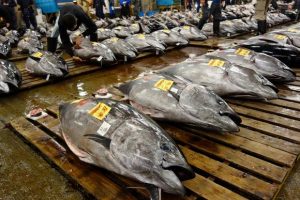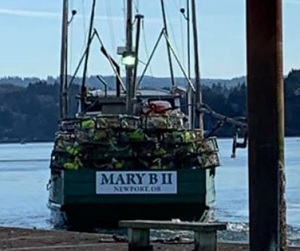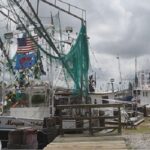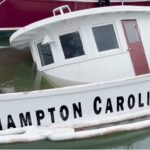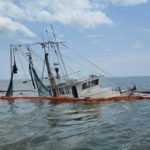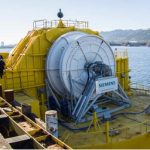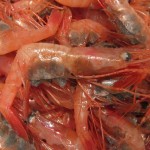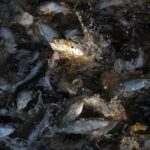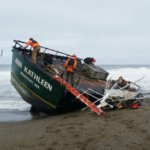Tag Archives: The Jones Act
U.S. Customs and Border Patrol wins one against American fish-shipping companies for violating antiquated Jones Act
 Two seafood shipping companies have settled a lawsuit challenging penalties and fines levied by U.S. Customs and Border Protection for violating the Jones Act, a more than 100-year old law requiring merchandise be transported by U.S. flagged vessels between U.S. ports. An exception to the U.S. flagged vessel requirement allows seafood from Alaska to be transported to the mainland U.S. if it travels via Canadian rail. The companies challenged the penalties and fines in the U.S. District Court of Alaska, saying they did not violate the Jones Act while transporting seafood from Alaska to the mainland U.S. because it was “transported” by Canadian rail.A settlement agreement was finalized between the companies and the U.S. in January. The agreement requires KIF and ARM to pay $9.5 million to the U.S. The companies also stopped using the BCR to transport seafood to the U.S. after this ruling. more, >>click to read<< 13:07
Two seafood shipping companies have settled a lawsuit challenging penalties and fines levied by U.S. Customs and Border Protection for violating the Jones Act, a more than 100-year old law requiring merchandise be transported by U.S. flagged vessels between U.S. ports. An exception to the U.S. flagged vessel requirement allows seafood from Alaska to be transported to the mainland U.S. if it travels via Canadian rail. The companies challenged the penalties and fines in the U.S. District Court of Alaska, saying they did not violate the Jones Act while transporting seafood from Alaska to the mainland U.S. because it was “transported” by Canadian rail.A settlement agreement was finalized between the companies and the U.S. in January. The agreement requires KIF and ARM to pay $9.5 million to the U.S. The companies also stopped using the BCR to transport seafood to the U.S. after this ruling. more, >>click to read<< 13:07
A reporter went on the Jones Act Enforcer vessel monitoring Vineyard Wind. What she saw.
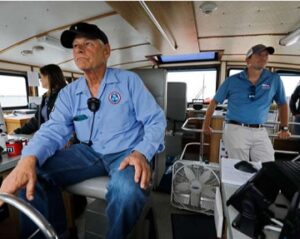 Aaron Smith, president and CEO of the Offshore Marine Service Association, was our host on this trip. It’s his intent on behalf of the association to be on the lookout for ships in violation of the Jones Act and taking jobs away from American workers. The ship is named after the Jones Act, a section of federal law that regulates maritime commerce in the United States by requiring that goods shipped between U.S. points be transported on ships that are built, owned and operated by United States citizens or permanent residents. Captain Rick Spaid and his crew sped through the water at about 17 knots give or take when he was able and brought us within about 0.5 nautical miles of the ships we saw. Photos, >click to read< 09:46
Aaron Smith, president and CEO of the Offshore Marine Service Association, was our host on this trip. It’s his intent on behalf of the association to be on the lookout for ships in violation of the Jones Act and taking jobs away from American workers. The ship is named after the Jones Act, a section of federal law that regulates maritime commerce in the United States by requiring that goods shipped between U.S. points be transported on ships that are built, owned and operated by United States citizens or permanent residents. Captain Rick Spaid and his crew sped through the water at about 17 knots give or take when he was able and brought us within about 0.5 nautical miles of the ships we saw. Photos, >click to read< 09:46
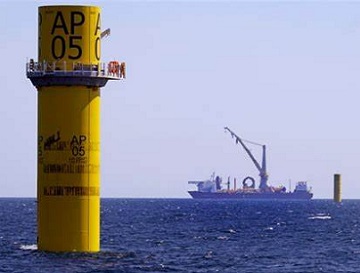
American boat patrols waters around new offshore wind farms to protect jobs
A battleship-gray vessel was on the prowl. In this ramp-up for U.S. offshore wind, American marine companies and mariners fear they’ll be left behind. So Aaron Smith, president of the Offshore Marine Service Association, was looking through binoculars to see whether ships servicing the new wind farms were using foreign-flagged vessels instead of U.S.-made ships with American crews. The ship is named the Jones Act Enforcer, after the century-old law that says the transport of merchandise between U.S. points is reserved for U.S.-built, owned and documented vessels. The motto: “We’ll be watching.” Smith was documenting operations to show to federal law enforcement officials and members of Congress. 15 Photos, >click to read< 10:02
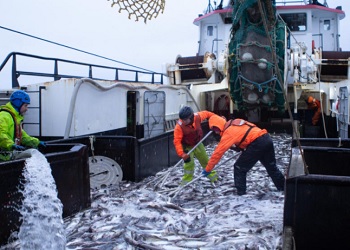
$350M Bering Sea fish fight could hinge on a miniature Canadian railroad
The quickly escalating saga involves hundreds of millions of dollars in fines, and a miniature Canadian railway,,, American Seafoods’ shipping subsidiary and an affiliate company, Kloosterboer International Forwarding, sued U.S. Customs and Border Protection in federal court Thursday,,, The Jones Act, a century-old federal law, typically requires American-flagged ships to move cargo between American ports. But the legislation contains an exception known as the “Third Proviso,” ,,Vessels flagged in countries like Singapore and the Bahamas first pick up frozen seafood products in Dutch Harbor, then travel to the Canadian port of Bayside, New Brunswick, just across the border from Maine. From Bayside, the seafood would be trucked to a Canadian train, loaded and moved 20 miles between two stations,,, >click to read< 14:10
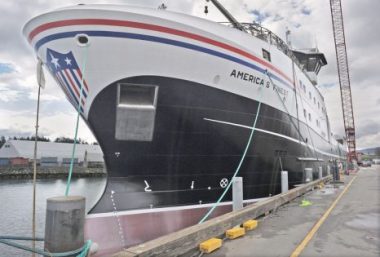
The Jones Act’s Strange Bedfellows
A strange thing happened on December 6th, 2018, when President Donald Trump signed a waiver that allowed the American business, Fishermen’s Finest, to sail its 80.5-meter fishing boat, America’s Finest, out of a Washington State shipyard over objections from special interest labor unions and trade associations. The ship was held in the harbor because its hull was made with too much Dutch steel. This violated the century-old protectionist law, the Jones Act, a little-known law passed in 1920. Even many of those who are hurt by it are unfamiliar with how this cumbersome law that likely costs the American economy millions of dollars every year. >click to read<15:53
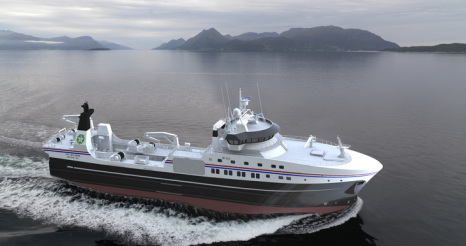
Pacific Seafood Processor’s Association seeks probe into America’s Finest foreign steel
The trade group representing Alaska’s onshore fish processing plants is challenging a request for an exemption to a federal law limiting the amount of foreign steel allowed in fishing vessel construction. The Pacific Seafood Processor’s Association has major issues with the request for a Jones Act waiver sought by Fisherman’s Finest, the owner of the embattled flatfish factory trawler American’s Finest, and its builder, the Washington shipyard Dakota Creek Industries. The 261-foot vessel is nearly complete at a cost of at least $60 million, and cannot fish in U.S. waters without the waivers. PSPA’s members include Unisea and Westward in Unalaska, and most of the other fish processors in Alaska. click here to read the story 09:52

































